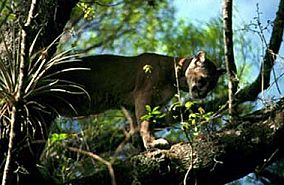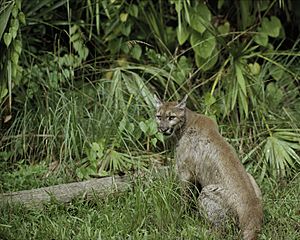Florida Panther National Wildlife Refuge facts for kids
Quick facts for kids Florida Panther National Wildlife Refuge |
|
|---|---|
|
IUCN Category IV (Habitat/Species Management Area)
|
|
 |
|
| Location | Collier County, Florida, U.S. |
| Nearest city | Naples |
| Area | 26,400 acres (107 km2) |
| Established | 1989 |
| Governing body | US Fish & Wildlife Service |
| Website | Florida Panther National Wildlife Refuge |

The Florida Panther National Wildlife Refuge is a special place in southwestern Florida, United States. It is about 20 miles east of Naples. This refuge is part of the National Wildlife Refuge System. It helps protect important animals and plants.
This large area, about 26,400 acres (107 square kilometers), was created in 1989. Its main goal is to protect the Florida panther. This panther is an endangered animal. It is the only type of cougar found east of the Mississippi River. The refuge also protects many other rare plants and animals.
The Florida Panther National Wildlife Refuge is part of a bigger network. This network includes other protected places like Everglades National Park and Big Cypress National Preserve. Less than 100 panthers live in this whole area. Only a few panthers visit the refuge each month.
To keep the panthers safe, most of the refuge is closed to visitors. You can only visit certain hiking trails in the southeast part. Other areas can only be seen during special tours.
What Plants Grow Here?
The refuge has different types of land. Some parts are dry uplands, while others are wetlands. You can find pine rocklands and tropical hardwood hammocks.
Many rare flowering plants grow here. These include beautiful tropical orchids. Some examples are Cyrtopodium punctatum and Epidendrum nocturnum.
What Animals Live Here?
Besides the famous panthers, many other animals call this refuge home. You might see Big Cypress fox squirrels and bobcats. There are also armadillos, raccoons, and black bears.
Other animals include coyotes and alligators. Look up to see swallow-tailed kites flying. You might also spot wood storks. These birds often build their nests in large groups called rookeries.
Facts and Figures
In 2005, the refuge had a staff of 18 people. Its yearly budget was about $1,500,000. This budget was shared with the Ten Thousand Islands National Wildlife Refuge. About 8,000 people visit the Florida Panther National Wildlife Refuge each year.
 | Misty Copeland |
 | Raven Wilkinson |
 | Debra Austin |
 | Aesha Ash |


